Latest press releases
A selection of stories from across the Federation

Netherlands
Rutgers triumphs in landmark court case against lies, online hate and disinformation
Rutgers, the Netherlands’ leading sexual and reproductive health expert and IPPF’s Member Association, has today secured a landmark legal win against an ultra-conservative group.
For media enquiries


| 26 September 2024
IPPF Statement on Escalation of Violence Against Health Care Workers
ENOUGH IS ENOUGH! Nearly a year into targeted, reproductive violence against Palestinian women and girls, and the bombing of our reproductive health site in Gaza; IPPF readies itself for a fresh wave of attacks against its health workers and clinics in Lebanon. "Our healthcare workers in Lebanon are under attack. 70% of them are women. The facilities where women come and access life-saving reproductive services have already been destroyed in Gaza. Now the world is forced to watch another horrific spectacle of the same war crimes being committed in Lebanon.” “We demand all governments - including the U.S., Germany, UK and others - that are supplying these weapons that kill, maim and displace our fellow healthcare workers to stop. We demand an end to the killing of ALL civilians; we will not be silenced, we will continue to collect evidence and talk about these crimes against our collective humanity,” said Dr. Alvaro Bermejo, Director General, International Planned Parenthood Federation. Israel's indiscriminate attacks on Gaza have had devastating consequences for women's reproductive health. The attacks on our own health site, on hospitals and maternal health sites significantly limited access to care. We are experiencing this in Sudan too; clinics destroyed, men’s use of violence against our health workers, and rape used as a weapon of war. In Palestine, obstetric and reproductive violence have been evidenced as a feature of Israel’s violence; we are urgently ringing all alarm bells before these crimes are repeated against women and girls in Lebanon. “Our staff are terrified; they are running for their lives. Contact with our team is limited - health care workers are too scared to use their phones. We fear not just for our colleagues; but for every single woman and girl. Once again, the very essence of humanity is at stake, as though women, children, and all human beings are merely numbers,” said Lina Sabra, Executive Director of IPPF Member Association in Lebanon, SALAMA. Lebanon is experiencing its deadliest days since the country’s civil war ended in 1990. The acceleration in killing over the past few days amid the escalation between Israel and Hezbollah is only made possible by powerful countries with a vested interest in the continuation of this war. We remind all parties that acts of obstetric and reproductive violence have been prosecuted as crimes against humanity.
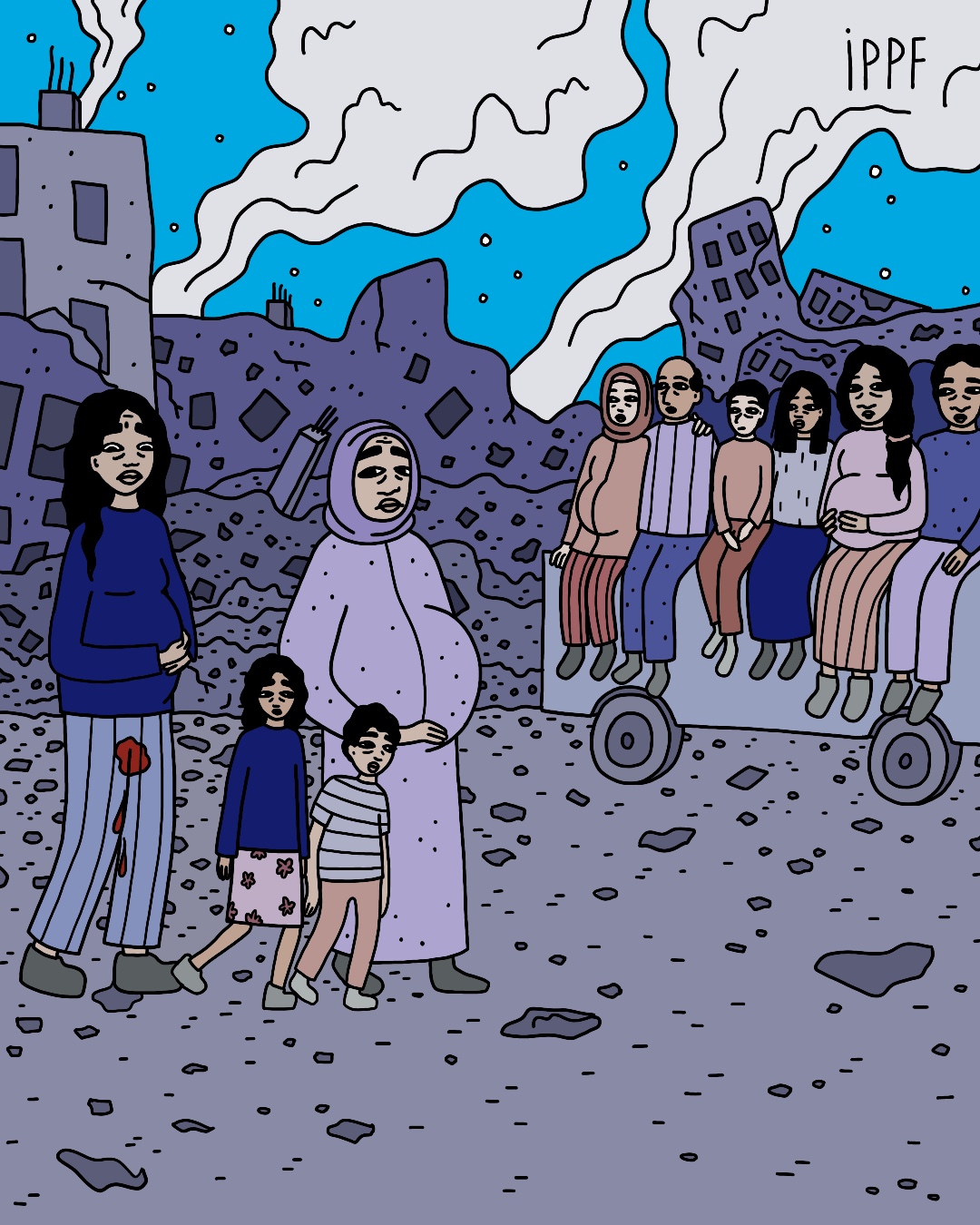
| 09 July 2024
Press Release: Gaza nine months on, pregnant women carry the burden of conflict
Jerusalem, 9 July 2024: Nine months on since the start of the Israeli aggression in Gaza, maternal healthcare is almost decimated. Pregnant, postpartum, and breastfeeding women in Gaza are facing serious health consequences. Miscarriages have risen at least 300% since October last year. One of our own health workers from the Palestinian Family Planning and Protection Association (PFPPA) recently lost her pregnancy due to the stress of the attacks. “I am a healthcare worker with PFPPA, and I have been forced to flee not once, not twice, but six times since the start of the violence, with my husband and three small children. Our home was destroyed by bombing. Whilst I was fleeing from one location to another, I started to unexpectedly bleed. I was able to find a doctor only after reaching Rafah, who confirmed I was miscarrying. I didn’t even realise I was pregnant,” Wafa, our healthcare worker in Gaza, told us. With the starvation being faced by the people in Gaza in addition to the lack of drinking water, our service providers are reporting on daily basis of pregnant women suffering from anaemia, malnutrition and in desperate need of prenatal vitamins and supplements. Our service providers in Gaza are also witnessing many women who are either having premature deliveries or miscarriages. Women of newborns are unable to breastfeed their babies due their own malnutrition and anxiety, while at the same time most families cannot afford milk formula as prices are becoming extremely high - and that is if they can find it in the market. When medical facilities are available, many women are unwilling to leave their shelters to obtain pre- and post-natal care, as they worry if they are separated from their families there will be military attacks and bombings and fear for their and their loved one's fate if they do so. Ammal Awadallah, Executive Director of PFPPA, said: “Nine months on, and a woman who conceived at the start of these hostilities will now be giving birth. But where, how, and what life is that baby entering? This will be a lost generation in Gaza, a generation born into genocide. We’re doing the best we can to offer support to women in Gaza, but the conditions to get aid into Gaza, let alone warehouse supplies, make our jobs extremely difficult. PFPPA has always been committed to women’s health and that doesn’t stop, now or ever.” Over 37,900 people have now lost their lives in Gaza. Women and girls that survive are facing a myriad of challenges; deprived of sexual and reproductive health services, sanitary and hygiene products. We believe every single person and organisation needs to mobilise to end this, by calling on their governments to demand unhindered humanitarian aid access, to demand a permanent ceasefire, and divest from any organisations aiding and abetting Israel’s military campaign against Palestine. We are working in close collaboration with colleagues in Palestine on how best to serve those caught up in the violence, to ensure health workers are safe and able to provide sexual and reproductive health care without threat to life. For more information and to speak to our Executive Director in Palestine, please email [email protected] About the Palestinian Family Planning and Protection Association Established in Jerusalem in 1964, the Palestinian Family Planning and Protection Association (PFPPA) is locally registered as an independent, non-profit and non-governmental association with headquarters in Jerusalem. PFPPA has service delivery points located in the West Bank Areas of Ramallah, Bethlehem, Hebron and Halhoul, in addition to one in the Gaza Strip, which has yet to be relocated after it was destroyed following an Israeli airstrike on 8 October. Furthermore, and in cooperation with local partners, PFPPA is also responsible for three safe spaces to provide Gender Based Violence (GBV) related services in the Jerusalem area. About the International Planned Parenthood Federation IPPF is a global healthcare provider and a leading advocate of sexual and reproductive health and rights (SRHR) for all. Led by a courageous and determined group of women, IPPF was founded in 1952 at the Third International Planned Parenthood Conference. Today, we are a movement of 150 Member Associations and Collaborative Partners with a presence in over 146 countries. Our work is wide-ranging, including comprehensive sex education, provision of contraceptive, safe abortion, and maternal care and responding to humanitarian crises. We pride ourselves on being local through our members and global through our network. At the heart of our mission is the provision of – and advocacy in support of – integrated healthcare to anyone who needs it regardless of race, gender, sex, income, and crucially no matter how remote.
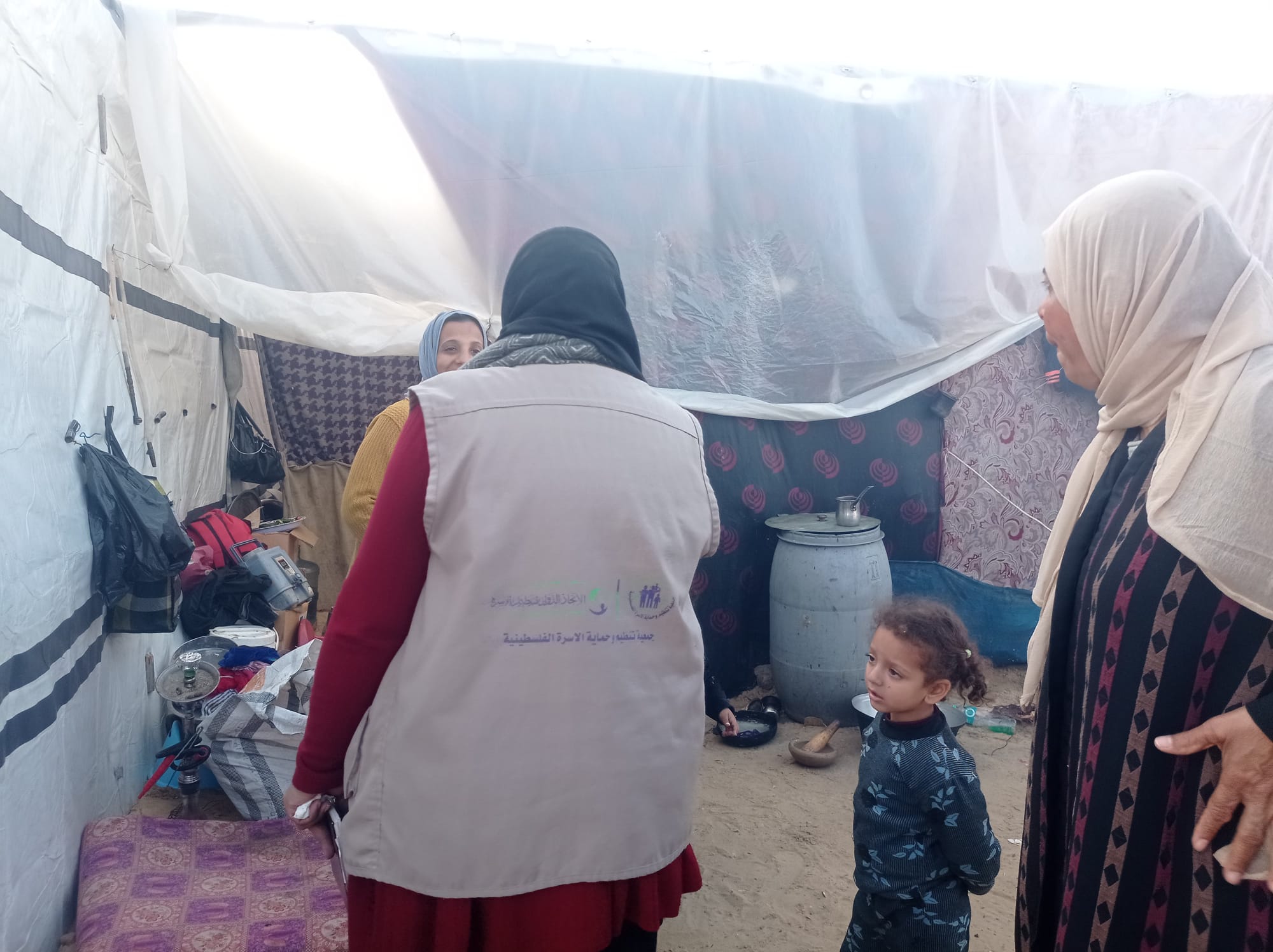
| 30 May 2024
Statement on Israel’s offensive in Rafah, Gaza
Another horrendous attack by Israel on displacement camps in Rafah, Gaza, has occurred this week, ignoring the orders of the UN’s top court, the International Court of Justice (ICJ), to halt its offensive. Thousands of innocent people are sheltering for their lives in this area, having been told to move there for their safety by Israeli authorities. Instead, they were attacked as they slept, with men, women and children facing nightmarish deaths. The deaths, displacement and destruction in Gaza must stop. We stand in support of Palestinians who have endured decades of apartheid, land dispossession, and gross human rights violations. The injustices faced by Palestinians are deeply rooted in colonialisation and lack of accountability. Our international systems, which were created to ensure international rule of war, must apply evenly to all member states – including those in the Global North. Over 37,000 people have now lost their lives. Women and girls that survive are facing a myriad of challenges, deprived of sexual and reproductive health services, sanitary and hygiene products. There must now finally be a critical mass of people of conscience saying enough is enough. Every single person needs to mobilise to end this, by calling on their governments to demand unhindered humanitarian aid access, and to call to trial any governments who have supplied weapons to Israel, aided in Israel’s impunity, and failed to call for a ceasefire. We call for an immediate end to Israel’s military offensive in Rafah and the ongoing atrocities across the Gaza Strip. Ammal Awadallah, Executive Director of the Palestinian Family Planning and Protection Association, said: “Every second, every minute that passes a horrific and devastating situation becomes worse. More and more people are being killed and seriously injured. Pregnant women are fearing the worse for their own fate and that of their pregnancies, what should be a happy time for expecting mothers has become for thousands a living nightmare. Women and girls are living in a state of anxiety and trauma of getting their period and not having access to menstrual pads, clean water or any sort of hygiene supplies. We need all people and governments to take a stand for what is right for humanity recognizing that the Palestinian people have a right to live with dignity and respect with full access to safe and sufficient health care. There is no justification, that this tragedy continues for millions of Palestinians in Gaza. An immediate and full ceasefire is the only option.” Dr Alvaro Bermejo, Director-General of IPPF, said: “In Rafah, nearly all hospitals in Rafah have been forcibly evacuated, and are either out of service or barely functioning, leaving no possibility for the provision of or access to medical care for pregnant women about to give birth. We are inspired by our health workers in Gaza, who continue to provide sexual and repreoductive healthcare to those in need, but our concern for them, and all Palestinians, will not stop until a permanent ceasefire is reached. All our humanity is on trial right now. Our organisation is committed to anti-colonialism, anti-racism, and liberation for all, we will speak out in defence of civilians facing peril every day. Silence is not an option.” For media enquiries, or to speak to our staff member in Palestine, please contact [email protected] Click here to donate to IPPF's emergency appeal for Palestine. About PFPPA Established in Jerusalem in 1964, the Palestinian Family Planning and Protection Association (PFPPA) is locally registered as an independent, non-profit and non-governmental association with headquarters in Jerusalem. PFPPA has service delivery points located in the West Bank Areas of Ramallah, Bethlehem, Hebron and Halhoul, in addition to one in the Gaza Strip, which has yet to be relocated after it was destroyed following an Israeli airstrike on 8 October. Furthermore, and in cooperation with local partners, PFPPA is also responsible for 3 safe spaces to provide Gender Based Violence (GBV) related services in the Jerusalem area. About the International Planned Parenthood Federation IPPF, through its 149 Member Associations and collaborative partners, delivers high-quality sexual and reproductive healthcare and helps advance sexual and reproductive rights, especially for marginalized people with diverse needs that are currently unmet. IPPF's Member Associations and partners are locally owned, independent organisations, which means the support and care they provide are informed by local expertise and context. IPPF advocates for a world where people have the information they need to make informed decisions about their sexual and reproductive health and their bodies. We stand up and fight for sexual and reproductive rights and against those who seek to deny people their human right to bodily autonomy and sexual and reproductive freedom. We deliver care rooted in rights, respect, and dignity for all - no matter what. Photo credit: IPPF/Samar Abu Elouf/Palestine
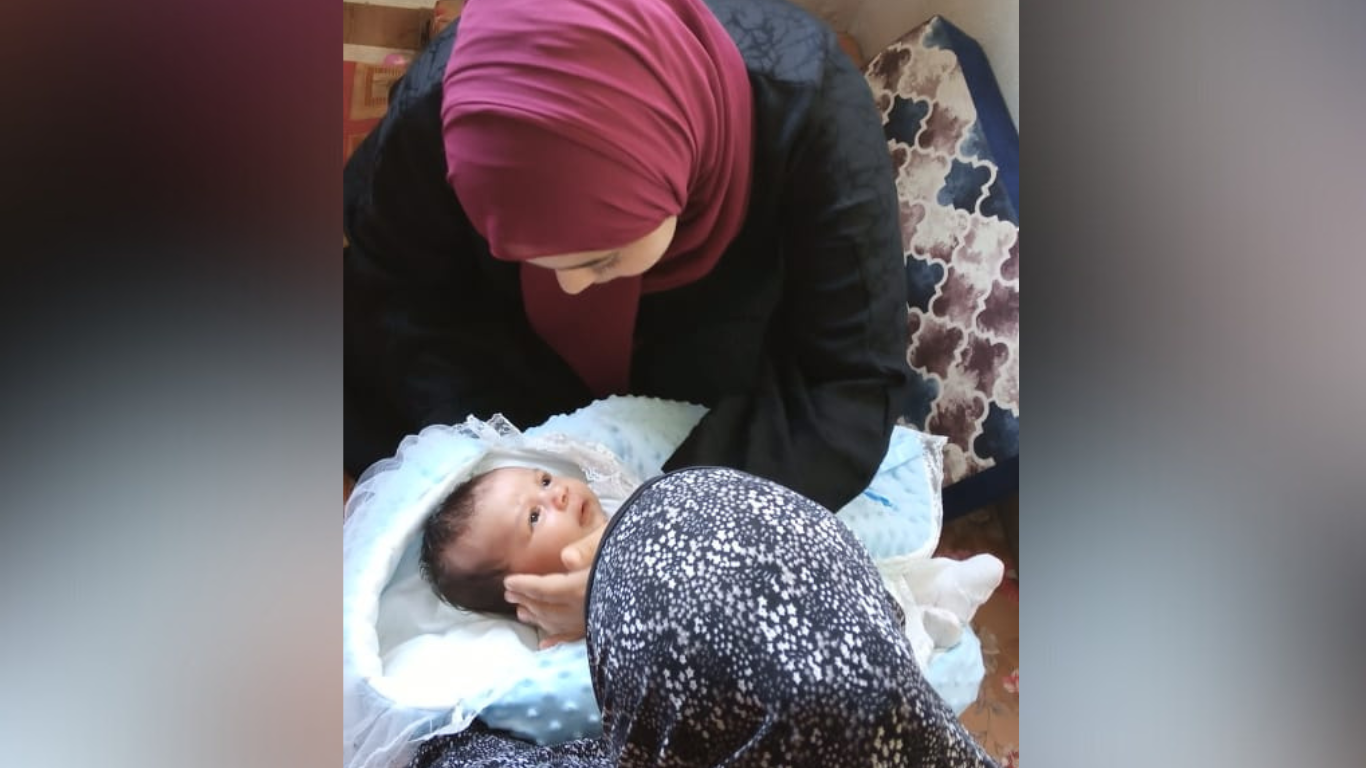
| 14 November 2023
With the forced closure of hospitals, midwives are a lifeline for pregnant women in Gaza
15 November 2023 - With the forced closure of Gaza’s largest hospital, Al Quds, due to the lack of fuel and incessant Israeli bombardment, and the recent storming of al-Shifa Hospital by Israeli forces, midwives are a lifeline for the estimated 180 women who are giving birth each day. As of 13 November, all but one of the hospitals in Gaza City and northern Gaza are reportedly out of service due to lack of power, medical consumables, oxygen, food and water, compounded by bombardments and fighting in their vicinities, according to OCHA. 26 year old Narmeen Al Shafee is a midwife currently living in Deir al-Balah in central Gaza, who has previously worked with the Palestinian Family Planning and Protection Association (PFPPA) outreach team. She describes the case of a 29-year-old pregnant woman who fled along with her family from Sheikh Radwan to Deir al-Balah to seek refuge in a school shelter near her home. The women was in her ninth month of pregnancy and not long after being displaced from her home she underwent a cesarean section. Midwife Al Shafee said: “After giving birth, and for her own safety, the shelters did not want to accommodate her due to the widespread infectious diseases and [the] high risk of infection since she had a cesarean section. Her husband was calling out in the streets for someone to receive his wife and three children. My parents welcomed them into our home to take care of her. I would change her bandages daily and monitor her and her child. After ten days, I removed the stitches. Thank God, her condition is now stable, and there are no problems.” In a separate case, Al Shafee describes caring for her 23-year-old cousin who was pregnant for the first time and lost her husband early in the war. “Her delivery date was approaching, and she gave birth at Nasser Hospital in Khan Younis [in southern Gaza]. Her child faced complications during birth, and due to the bombings she sought refuge with us. I took care of her and her child until their situation stabilized. Now, I am helping her with breastfeeding, as she is finding it difficult.” Aminah*, another midwife who has also previously worked with the PFPPA outreach team, said: “I’ve been in contact with two pregnant women multiple times, providing weekly consultations. One woman experienced severe cramps, and after offering advice, she was referred to the hospital. She needed lung maturation injections for the fetus, along with rest and nutritional supplements and iron. Another woman, 29 weeks pregnant, suffered dizziness and vomiting and she took Ancozine [an antiemetic] for nausea during the visit. I also found out that she was taking iron and provided her with information on the correct way to take iron tablets in order for her to benefit from them as needed. I am also providing information to women in my area and around me hoping that it will help them if and when needed.” According to data from the UNFPA, there are an estimated 50,000 pregnant women in Gaza, with 15% expected to encounter complications. In many instances women are only admitted to hospital when they are fully dilated, with some forced to deliver their babies in cars, in the streets, and in overcrowded shelters where the risk of infection and the spread of disease is high. There are reports of c-sections bring performed without anesthesia, and there is currently no type of post natal care available in Gaza. Levels of early labor and miscarriages are expected to increase with the trauma and conditions being faced. Al Ahli Hospital, in Gaza City, which currently accommodates over 500 patients, is reportedly the sole medical facility able to receive patients, amid increasing shortages and challenges. In Shifa hospital, 32 patients, including three premature babies, have reportedly died since 11 November, following the power cut and amid dire conditions. Without a full and immediate ceasefire, and the unimpeded delivery of humanitarian aid across all parts of Gaza, maternal and neonatal deaths will continue to rise. For media enquiries, or to speak to our staff member in Palestine, please contact [email protected] Click here to donate to IPPF's emergency appeal for Palestine. About PFPPA Established in Jerusalem in 1964, the Palestinian Family Planning and Protection Association (PFPPA) is locally registered as an independent, non-profit and non-governmental association with headquarters in Jerusalem. PFPPA has service delivery points located in the West Bank Areas of Ramallah, Bethlehem, Hebron and Halhoul, in addition to one in the Gaza Strip, which has yet to be relocated after it was destroyed following an Israeli airstrike on 8 October. Furthermore, and in cooperation with local partners, PFPPA is also responsible for 3 safe spaces to provide Gender Based Violence (GBV) related services in the Jerusalem area. About the International Planned Parenthood Federation IPPF, through its 149 Member Associations and collaborative partners, delivers high-quality sexual and reproductive healthcare and helps advance sexual and reproductive rights, especially for marginalized people with diverse needs that are currently unmet. IPPF's Member Associations and partners are locally owned, independent organisations, which means the support and care they provide are informed by local expertise and context. IPPF advocates for a world where people have the information they need to make informed decisions about their sexual and reproductive health and their bodies. We stand up and fight for sexual and reproductive rights and against those who seek to deny people their human right to bodily autonomy and sexual and reproductive freedom. We deliver care rooted in rights, respect, and dignity for all - no matter what. Banner image: Midwife Narmeen Al Shafee provides care to a newborn baby in Deir al-Balah, in central Gaza.

| 07 November 2023
30 Days Too Many for Women and Girls in Gaza
Today marks one month since Hamas launched its attack on civilians that triggered Israel’s declaration of an unprecedented war in the Gaza Strip, and a subsequent humanitarian catastrophe. Since 7 October, some 1,400 Israeli civilians have been killed, 200 hostages taken, and thousands injured, according to the Israeli authorities. In Gaza, over 10,000 people have been killed, the vast majority of whom are women and children. IPPF echoes international demands for an immediate and full ceasefire to prevent further atrocities. The continued bombing and rockets will make it virtually impossible to distribute any aid to civilians. In addition to the immediate need for fuel, water, food, and medicine for civilians in Gaza, the urgency of sexual and reproductive health care needs must not be overlooked. Alvaro Bermejo, IPPF Director General said: “Our colleagues in Gaza are currently sheltering for their lives, yet still delivering sexual and reproductive healthcare in any way they can amid appalling conditions. For 30 days, bombs have been falling across Gaza, leaving behind devastation and destruction unlike anything we have dealt with before as a Federation. In the absence of a full ceasefire, we are gravely concerned for the lives of our colleagues, civilians, and humanitarians who are desperately trying to deliver aid inside Gaza.” Insufficient supplies, resources and equipment for sexual and reproductive health and rights were already a pressing issue in Gaza, which has been under Israeli occupation and blockade for decades. Since 7 October, thousands of Palestinian mothers and children have been killed, marking a recurring stifling of reproductive justice in the region. Pregnant women are miscarrying due to stress and shock, and the availability of medical facilities to birth safely is now virtually non-existent. Women and girls are reporting a severe lack of menstrual hygiene products and contraceptives, and a rise in cases of sexually transmitted diseases and urinary tract infections with little to no medical treatment available. Without a full and immediate ceasefire, we can expect to see this vicious cycle continue, with thousands more maternal and newborn deaths. On top of this, we will see a rise in unintended pregnancies, the spread of sexually transmitted infections including HIV, and a rise in psychological trauma and conflict-related sexual violence, all of which will have long-term, generational impacts. We echo calls by the UN Inter-Agency Standing Committee to establish a robust aid operation in a safe and peaceful context. Gaza needs a coordinated effort that meets the urgent needs of all its people, including the particular sexual and reproductive healthcare needs of women, girls and vulnerable groups. There are no justifications for war crimes or grave violations of international humanitarian law, regardless of who commits them or against whom they are committed. We reaffirm that all people have the right to access emergency sexual and reproductive healthcare, no matter where, and no matter what. IPPF calls for an immediate ceasefire to end the violence, deaths and suffering of civilians in Israel and Palestine. This ceasefire is an essential precursor towards a path to peace with justice. For media enquiries, or to speak to our staff member in Palestine, please contact [email protected] Click here to donate to IPPF's appeal for Palestine. About PFPPA Established in Jerusalem in 1964, the Palestinian Family Planning and Protection Association (PFPPA) is locally registered as an independent, non-profit and non-governmental association with headquarters in Jerusalem. PFPPA has service delivery points located in the West Bank Areas of Ramallah, Bethlehem, Hebron and Halhoul, in addition to one in the Gaza Strip, which has yet to be relocated after it was destroyed following an Israeli airstrike on 8 October. Furthermore, and in cooperation with local partners, PFPPA is also responsible for 3 safe spaces to provide Gender Based Violence (GBV) related services in the Jerusalem area. About the International Planned Parenthood Federation IPPF, through its 149 Member Associations and collaborative partners, delivers high-quality sexual and reproductive healthcare and helps advance sexual and reproductive rights, especially for marginalized people with diverse needs that are currently unmet. IPPF's Member Associations and partners are locally owned, independent organisations, which means the support and care they provide are informed by local expertise and context. IPPF advocates for a world where people have the information they need to make informed decisions about their sexual and reproductive health and their bodies. We stand up and fight for sexual and reproductive rights and against those who seek to deny people their human right to bodily autonomy and sexual and reproductive freedom. We deliver care rooted in rights, respect, and dignity for all - no matter what.
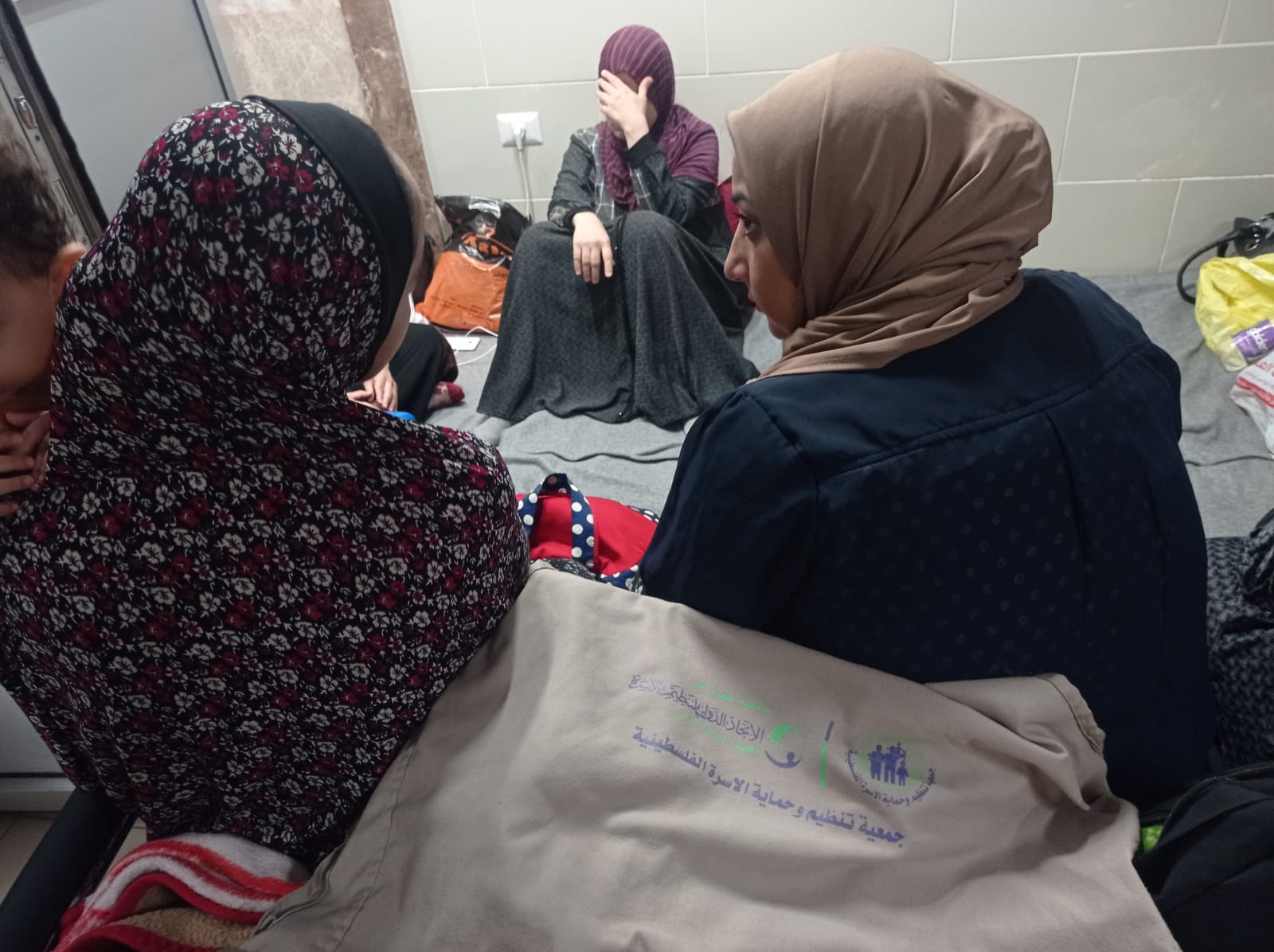
| 26 October 2023
Dire lack of sexual and reproductive health supplies, disease outbreak in Gaza shelters
Shelter conditions in Gaza for the estimated 1.4 million internally displaced people have become dire, with women and girls reporting a severe lack of menstrual hygiene products, cases of sexually transmitted diseases and urinary tract infections with little to no medical treatment available in the severely overcrowded shelters. Contraception is in very short supply, and according to our local team sheltering and providing services in Gaza, women are sharing contraceptive pills. Women with intrauterine contraceptive devices (IUDs) are experiencing bleeding and infections due to the unhygienic conditions in the camps. There are currently no options for IUD removal in Gaza, posing long term risks to women’s reproductive health, including severe bleeding. On 25 October, the UN said that fuel in Gaza could run out within hours, and that hospitals in the Gaza Strip are taking emergency cases only, which will prevent many women and girls from seeking sexual and reproductive health care. If Israel continues to block humanitarian aid including safe delivery kits from entering Gaza, many of the estimated 50,000 pregnant women[1] in Gaza will have no safe place to give birth, with at least 15% likely to experience complications[2], further compromising already stalled progress in reducing the rates of maternal morbidity and mortality. Wafa Abu-Hasheish, a health worker at PFPPA in Gaza said: “The shelter is suffering from a shortage of water, lack of medical care, and an increase in the incidence of diseases such as influenza, chest infections, skin ulcers, scabies, lice, and diarrheal diseases, and girls and women are reporting menstrual disturbance. There are also cases of sexually transmitted infections and urinary tract infections. Women using contraceptive pills are sharing their supplies with others." The number of internally displaced persons (IDPs) in Gaza is currently estimated at around 1.4 million (more than half the population), with a large part of that population living in overcrowded and under-supplied shelters with food, water, and fuel running out – and basic and life-sustaining services becoming more inaccessible by the hour. The mental and physical health toll on local health workers in Gaza is immense. Abu-Hasheish added: “On a personal level, being the service provider and being present in the shelter has caused me several psychological problems, stress, and fear. I also suffer problems such as neck ache and back muscle tension due to the inability to sleep or sit properly. I have contracted a flu and developed excessive breathing difficulties, but there is a lack of available treatment for displaced people due to the high number of patients and the scarcity of medicines. I had to go home for rest and relaxation, despite the dangers and lack of safety at home. Ammal Awadallah, the Executive Director of the Palestinian Family Planning and Protection Association (PFPPA) said: "If pregnant women are lucky enough to reach a health center or hospital, they are only admitted when they are fully dilated. And they must leave the hospital within three hours after delivery, due to overcrowding in hospital facilities, lack of space and resources. “Women are forced between choosing privacy and a clean space in their own homes, where they still stand, or shelters with dire conditions. It is choosing between the different evils. There is no safe place in Gaza.” For media enquiries, or to speak to our staff member in Palestine, please contact [email protected] Click here to donate to IPPF's appeal for Palestine. About PFPPA Established in Jerusalem in 1964, the Palestinian Family Planning and Protection Association (PFPPA) is locally registered as an independent, non-profit and non-governmental association with headquarters in Jerusalem. PFPPA has service delivery points located in the West Bank Areas of Ramallah, Bethlehem, Hebron and Halhoul, in addition to one in the Gaza Strip, which has yet to be relocated after it was destroyed following an Israeli airstrike on 8 October. Furthermore, and in cooperation with local partners, PFPPA is also responsible for 3 safe spaces to provide Gender Based Violence (GBV) related services in the Jerusalem area. About the International Planned Parenthood Federation IPPF, through its 149 Member Associations and collaborative partners, delivers high-quality sexual and reproductive healthcare and helps advance sexual and reproductive rights, especially for marginalized people with diverse needs that are currently unmet. IPPF's Member Associations and partners are locally owned, independent organisations, which means the support and care they provide are informed by local expertise and context. IPPF advocates for a world where people have the information they need to make informed decisions about their sexual and reproductive health and their bodies. We stand up and fight for sexual and reproductive rights and against those who seek to deny people their human right to bodily autonomy and sexual and reproductive freedom. We deliver care rooted in rights, respect, and dignity for all - no matter what. [1] Source: UNFPA [2] Source: MISP
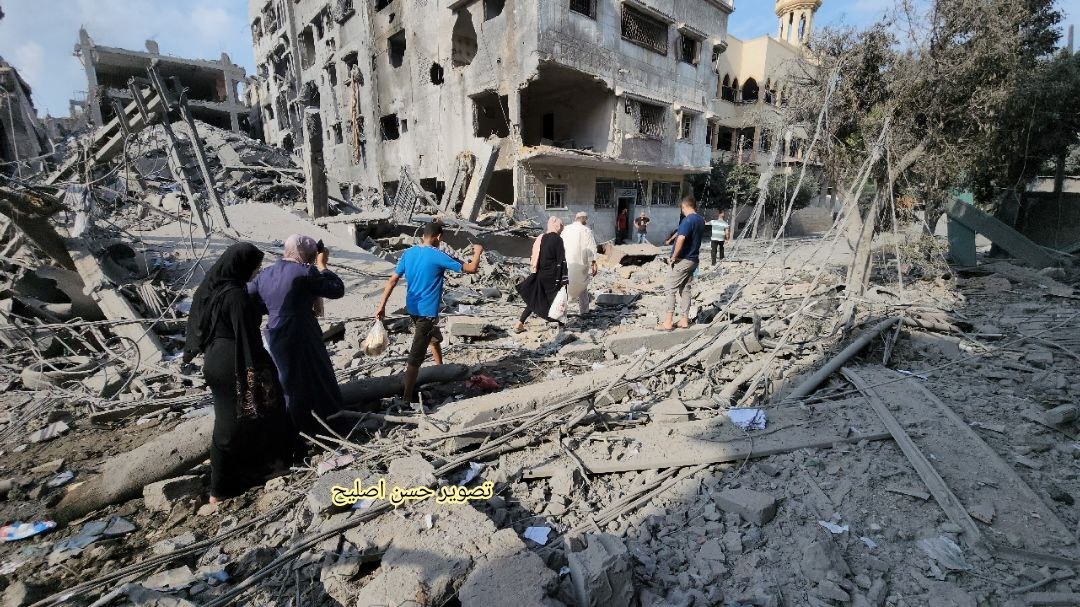
| 12 October 2023
Over 37,000* pregnant women at risk of life-threatening complications in Gaza
Over 50,000* pregnant women will be forced to give birth with no electricity or medical supplies in Gaza in the coming months, risking life-threatening complications without access to delivery and emergency obstetric care services. Ammal Awadallah, Executive Director of the Palestinian Family Planning and Protection Association (PFPPA) said: “We don’t know what’s going to happen to these women and their newborn babies. Our center is unusable and our options to provide referrals to hospitals are decreasing by the hour. I can’t stress enough how dire the situation is and how desperately we need humanitarian aid to be allowed into Gaza.” On 8 October, PFPPA’s only center in Gaza was destroyed following an Israeli airstrike to an adjacent building, completely cutting off their ability to offer healthcare to women who have already been systematically denied sexual and reproductive healthcare and rights by the Israeli occupation. Israel’s complete blockade of Gaza, as announced on 10 October, is preventing food, water, fuel, and medical supplies into Gaza. Currently, Gazans are only able to access electricity for two hours every day - this supply is due to completely run out in the next few days. The medical system in Gaza, already severely stretched due to 16 years of an illegal blockade, cannot cope with the level of injuries from the current bombardment. Emergency services and medical supplies are not able to reach affected people, including pregnant women, women in labour and newborn babies. It's estimated that 60% of those injured and killed since 10 October are women and children. On 11 October, the only power plant in Gaza ran out of fuel, and three of five water plants are out of service due to the Israeli bombing and lack of fuel. Without clean water, food, basic medicines and vaccines, innocent women and newborn babies will continue to die. Wafa Abu Hasheish, a health worker at PFPPA in Gaza said: "As a health worker and a Palestinian woman, ever since Saturday morning I have been living in constant fear for the safety and livelihood of my family. At the same time I am not able to leave behind my commitment to providing women with health services and information. I have received calls from women having a miscarriage due to the bombings and gas, another going into labor, neighbors reaching out for help… all of which I am trying to assist but with such limited options and resources available and accessible.. I am afraid for their well beings and even for their lives. I do not know how much more the Gazans can take and I am constantly thinking how many more women around Gaza have no one or nowhere to go." Note: This figure was calculated using the Minimum Initial Service Package (MISP) calculator based on the most recent available statistics on the population of Gaza. On 16 October, UNFPA released updated statistics that show there are currently at least 50,000 pregnant women in Gaza. For media enquiries, or to speak to our staff member in Palestine, please contact [email protected] Click here to donate to IPPF's appeal for Palestine. About PFPPA Established in Jerusalem in 1964, the Palestinian Family Planning and Protection Association (PFPPA) is locally registered as an independent, non-profit and non-governmental association with headquarters in Jerusalem. PFPPA has service delivery points located in the West Bank Areas of Ramallah, Bethlehem, Hebron and Halhoul, in addition to one in the Gaza Strip, which has yet to be relocated after it was destroyed following an Israeli airstrike on an adjacent building on 8 October. Furthermore, and in cooperation with local partners, PFPPA is also responsible for 3 safe spaces to provide Gender Based Violence (GBV) related services in the Jerusalem area. About the International Planned Parenthood Federation IPPF, through its 149 Member Associations and collaborative partners, delivers high-quality sexual and reproductive healthcare and helps advance sexual and reproductive rights, especially for marginalized people with diverse needs that are currently unmet. IPPF's Member Associations and partners are locally owned, independent organisations, which means the support and care they provide are informed by local expertise and context. IPPF advocates for a world where people have the information they need to make informed decisions about their sexual and reproductive health and their bodies. We stand up and fight for sexual and reproductive rights and against those who seek to deny people their human right to bodily autonomy and sexual and reproductive freedom. We deliver care rooted in rights, respect, and dignity for all - no matter what. *At the time of this press release on 12 October 2023, we reported that there were an estimated 37,000 pregnant women in Gaza, which was calculated using population estimates from the MISP calculator - a tool that helps coordinators and program managers determine affected population demographics for advocacy, fundraising and programming. This statistic has since been updated to an estimated 50,000 pregnant women in Gaza, with 5,500 expected to deliver in the next month, according to the most recent available data from the UNFPA.
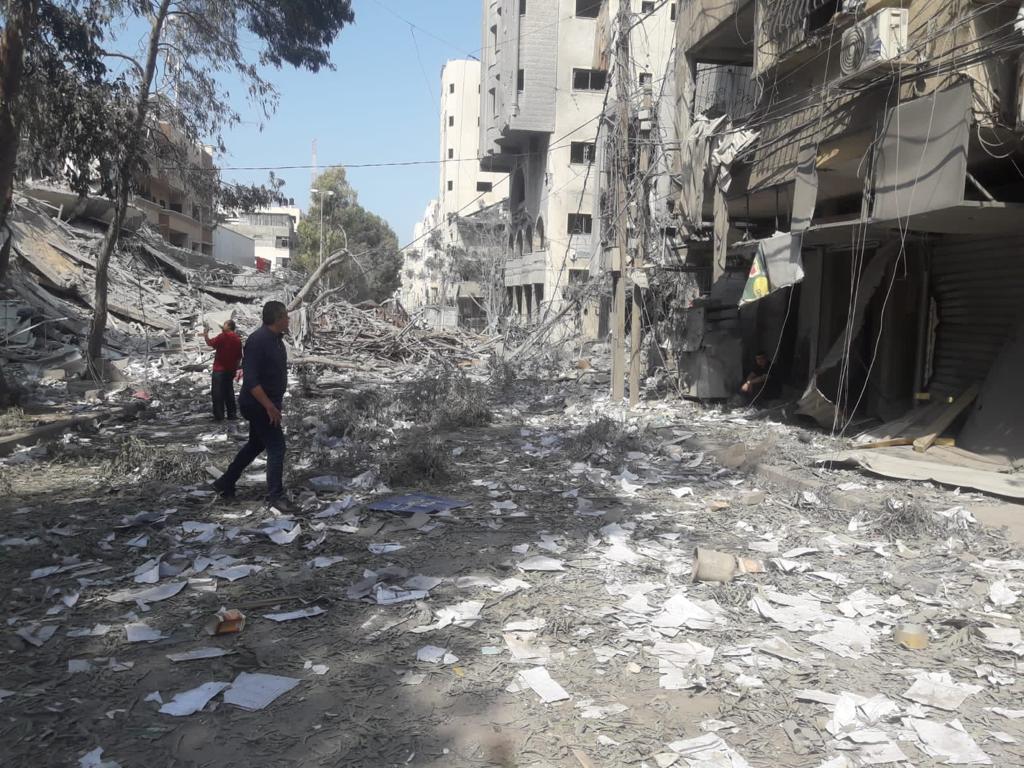
| 09 October 2023
IPPF Statement on the Escalating Violence in Gaza
London, 9 October 2023 - Over the past few days, we have watched in horror the escalating violence between Hamas and Israel, the loss of civilian lives and the targeting of health facilities. In response, IPPF has released a media statement on behalf of the Federation and its Member Association directly impacted by the violence. As in all conflict and humanitarian situations, sexual and reproductive health, rights and justice (SRHRJ) challenges will increase significantly in Palestine following the latest outbreak of violence and the targeting of health infrastructure. Sexual and Reproductive Health and Rights must be prioritized now in Palestine, especially for women, girls and the most vulnerable and marginalized groups among them, who have already been facing a protracted humanitarian crisis for decades. IPPF’s Director-General, Dr Alvaro Bermejo, said: "The International Planned Parenthood Federation (IPPF) is deeply concerned about civilians caught up in the recent attacks, and we are devastated by the loss of civilian lives. At a time where human rights are increasingly under attack, we take our responsibility to preserve the enormous gains made in life-saving sexual and reproductive healthcare in this region very seriously, especially for women, girls and marginalised populations, whose vulnerability and experiences are so often overlooked in humanitarian and conflict settings. "Since its establishment in 1964, the Palestinian Family Planning and Protection Association (PFPPA), our local Member Association in Palestine has worked in the most difficult of circumstances to strengthen and protect the reproductive rights of people living in Gaza, the West Bank and Jerusalem. “Our local teams are now contingency planning to address not only the needs of those trapped in Gaza amid escalating violence, but also the more than five million Palestinians currently living under Israeli occupation who will require critical support to continue accessing sexual and reproductive healthcare. We will work closely with partners and other NGOs to ensure the least possible disruption to services, and we will continue to monitor the situation closely to ensure the safety and security of our colleagues across the region.” Ammal Awadallah, Executive Director of the Palestinian Family Planning and Protection Association (PFPPA), IPPF’s local Member Association in Palestine said: “The current situation in Palestine is different than other situations of escalating hostilities. We have many staff that are afraid to come into work, and we had colleagues that were stuck at the border and unable to return home following IPPF meetings outside of the country. On 8 October, one of our critical service delivery points in Gaza was destroyed. While this building can be compensated, lives cannot. PFPPA has been bravely providing services within this protracted humanitarian crisis setting for decades. This has made us stronger and increased our commitment to women and girls, but we are now facing a dire situation. Basic sexual and reproductive health care commodities, like condoms, are banned in Gaza. The total blockade of Gaza will only worsen the situation for millions of desperate people who are denied their most basic of human rights. Palestinians are systematically denied sexual and reproductive healthcare and rights. Our health system has been repeatedly targeted and depleted by the Israeli occupation, and the more it disintegrates, the more it will hinder the full realization of these rights for women and girls.” بالنسبة لوسائل الإعلام العربية، يرجى الاتصال بمصطفى كميل el [email protected] For UK and other international media outlets, please contact [email protected] About the Palestinian Family Planning and Protection Association (PFPPA) Established in Jerusalem in 1964, the Palestinian Family Planning and Protection Association (PFPPA) is locally registered as an independent, non-profit and non-governmental association with headquarters in Jerusalem. PFPPA has service delivery points located in the West Bank Areas of Ramallah, Bethlehem, Hebron and Halhoul, in addition to one in the Gaza Strip, which has yet to be relocated after it was destroyed following an Israeli airstrike to an adjacent building on 8 October. Furthermore, and in cooperation with local partners, PFPPA is also responsible for 3 safe spaces to provide Gender Based Violence (GBV) related services in the Jerusalem area. About the International Planned Parenthood Federation The International Planned Parenthood Federation (IPPF) is a global service provider and advocate of sexual and reproductive health and rights for all. For 70 years, IPPF, through its 150 Member Associations and collaborative partners, has delivered high-quality sexual and reproductive healthcare and helped advance sexual rights, especially for people with intersectional and diverse needs that are currently unmet. Our Member Associations and partners are independent organisations that are locally owned, which means the support and care they provide is informed by local expertise and context. We advocate for a world where people have the information they need to make informed decisions about their sexual health and bodies. We stand up and fight for sexual and reproductive rights and against those who seek to deny people their human right to bodily autonomy and freedom. We deliver care that is rooted in rights, respect, and dignity - no matter what.
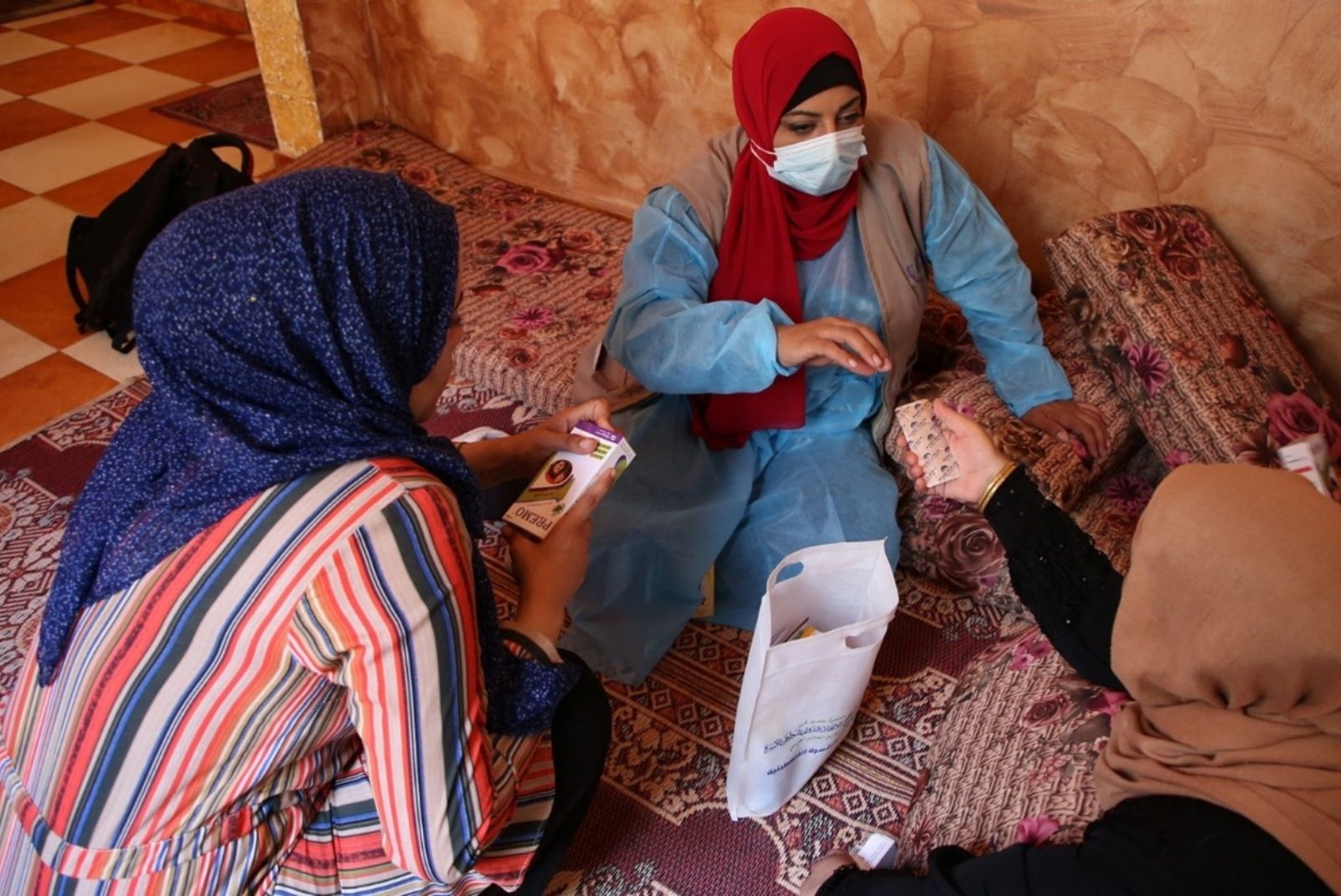
| 29 March 2022
Government of Japan, through its support for IPPF, will provide life-saving health care services to the most vulnerable populations in Palestine
With support from the Government of Japan, the IPPF Member Association in Palestine (PFPPA) is launching a new project in Palestine targeting the most vulnerable populations that have been severely affected by the humanitarian crisis and the COVID-19 pandemic. It is estimated that at least 1.45 million people in Palestine are in need of healthcare-related humanitarian assistance. The escalation of the conflict in Gaza in May 2021, in addition to the long-standing severe restrictions on movement and inadequate healthcare systems, have resulted in the loss of many lives, the destruction of the healthcare system, and negative impacts of the COVID-19 pandemic. Together these have increased poverty levels and strained the healthcare system resulting in increased humanitarian and medical assistance needs. In 2022, it is estimated that 63% of the population living in Gaza and 23% in the West Bank will continue to need humanitarian assistance. The vulnerability of women and girls in particular is even greater, with serious and sometimes life-threatening health consequences. In this context, PFPPA will reach vulnerable and hard-to-reach populations (especially women and girls) with sexual and reproductive health and rights (SRHR) services, including sexual and gender-based violence (SGBV) related services. This will focus on five locations: Gaza, Hebron, Halhoul, Bethlehem and Ramallah. By the end of February 2023, PFPPA aims to: Deliver quality SRHR and SGBV-related services to approximately 36,000 women and young people through PFPPA clinics in the 5 project target areas. Deliver a Minimum Initial Service Package for reproductive health in crisis situation (MISP: sexual and gender-based violence response, HIV and sexually transmitted disease prevention and treatment, emergency obstetric newborn care, family planning, comprehensive abortion care, etc.) to 4,800 people through mobile clinics in project target areas in Gaza and the West Bank. Deliver prenatal and postpartum door-to-door services to 160 women, including counselling and services to promote healthy pregnancies and prepare women for childbirth. Deliver "birth preparedness" services to 30 women and distribute kits consisting of basic supplies for pre- and postpartum preparation, including essential newborn care. Deliver SRH and SGBV services to 2,000 women and girls through mobile apps and telecommunication projects. H.E. Hajime Hayashi, Ambassador of Japan to the United Kingdom, said: “We are delighted to be working with the IPPF to improve the health of women in Palestine, who are increasingly vulnerable to the humanitarian crisis and the impact of the new coronavirus outbreak. This effort will not only contribute to the realization of Japan's emphasis on Universal Health Coverage (UHC), but will also have a direct effect on human security.” Dr Alvaro Bermejo, Executive Director of IPPF, said: “With the support of the Japanese government, IPPF will be able to provide health and life-saving services to vulnerable women in Palestine. We are very grateful for the opportunity to work with the Japanese government to stand with those affected by the conflict and the COVID-19 to ensure that no one is left behind.” Ms Ammal Awadallah, Executive Director of PFPPA, said: “PFPPA is committed to ensuring that all services provided by their team to the population, regardless of each individual's circumstances, are of high quality and are provided securely, with dignity and respect, protecting all those involved from any form of harm. Furthermore, through the generous support of the Japanese government, for which we are greatly appreciative, PFPPA will be able to deliver essential services related to Sexual Reproductive Health Rights (including SGBV) to those living in marginalized and remote areas most in need of such services.” International Planned Parenthood Federation (IPPF): Founded in 1952 in Bombay, India, IPPF’s founding members included Madam Shizue Kato, one of Japan's first female parliamentarians and the leader of the family planning movement. Today, IPPF is one of the world's largest international NGOs working to defend sexual and reproductive health and rights and to deliver SRH services and information to all people (especially vulnerable people) through its grassroots network of 120 Member Associations and Collaborative Partners working in 140 countries including Palestine around the world. Contact: Yuri Taniguchi, Chief Strategic Partnerships and Development Advisor (S.E.Asia), International Planned Parenthood Federation (IPPF) London Office
















